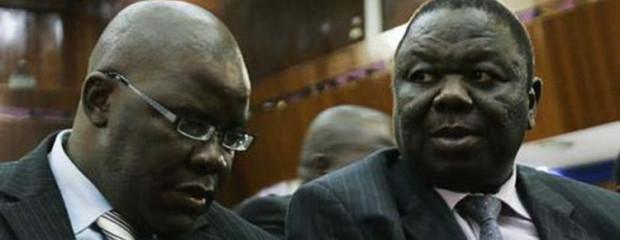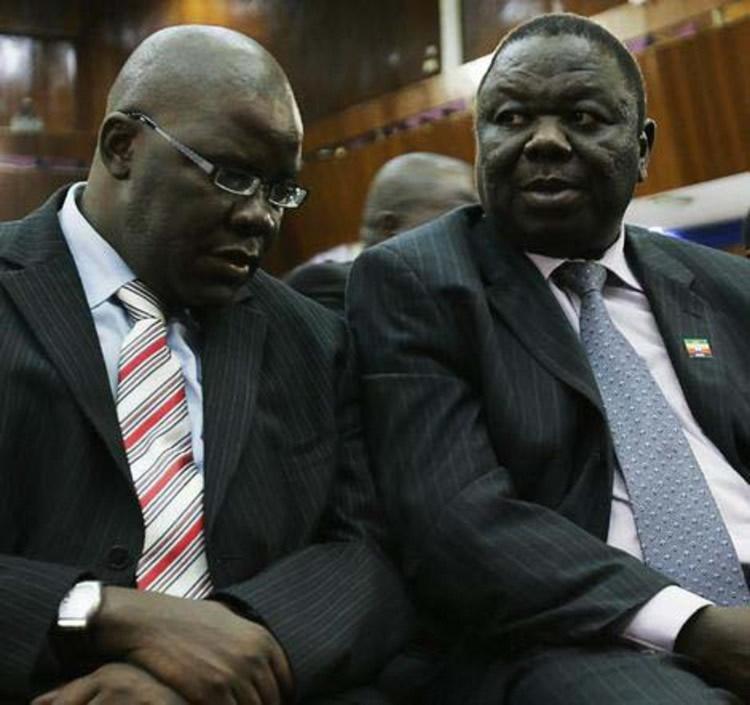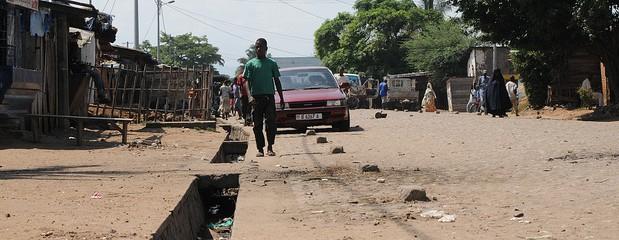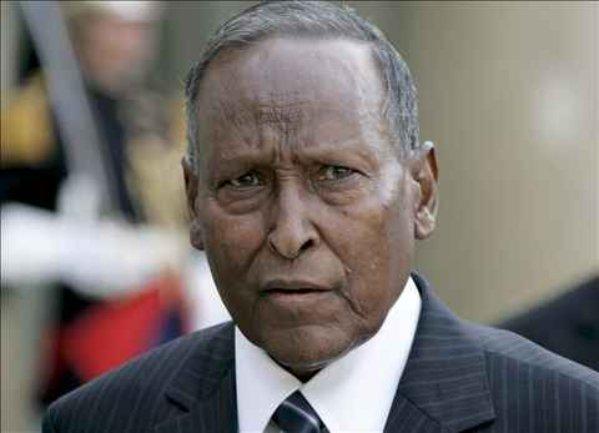Tsvangirai vs Biti: battle for control of the MDC – By Simukai Tinhu

The ambush two months ago by the Secretary General of the Movement for Democratic Change (MDC), Tendai Biti, against the party’s strongman, Morgan Tsvangirai, has set the two long-time rivals up in bitter fight to land the party leadership. Having started in the apex of the party’s political power, the National Council, the battle has now diffused to other areas. The question is who will blink first?
In this battle, the two men and their political teams have adopted different strategies. On one hand, Tsvangirai has sought a short-term strategy that maximises the advantages that he enjoys over Biti. The most critical element of this is to continually pitch himself as the most popular MDC official with rank and file party members. Because of this stronger voter base, his aides argue, he is in a better position to take the party forward. Tsvangirai also controls the party machinery, including the militia. Previously, he has shown that he has the will, if it becomes necessary, to deploy militants in order to halt Biti’s ascendancy.
No less determined, on the other hand, Biti has adopted a studied long term strategy designed to continually undermine Tsvangirai’s authority, with the ultimate aim of breaking the Tsvangirai brand. This explains why the renewal team is increasingly using clichés such as ‘authoritarian’ or ‘power hungry’ when referring to the MDC leader. At the very least, Biti’s plan is to make his adversary look weak by comparison to the MDC political juggernaut which dominated opposition politics in the first 10 years of the 21st century.
To date, Tsvangirai has benefitted from a sympathetic local media to advance his case. His political mandarins have worked in tandem with loyal newspapers to dramatically project him as a man firmly in the driving seat. But, when one peers behind the curtain, one sees that the “˜renewal team’ of Biti is catching up in the race. Indeed, in some cases, Tsvangirai has found himself playing a desperate game of catch up.
For example, recently, the battle entered the legislative house. Pre-emptively, in late April 2014, Biti wrote to the speaker of parliament seeking to shield the nine legislators aligned to his faction from potential expulsion from the party. This provoked apoplexy among many in Tsvangirai’s team who within a few days of this move went on to write to the same speaker of parliament, Jacob Mudenda, seeking the ejection of Biti’s MPs.
Mudenda responded by referring the case to the courts. His argument was that the parliament had no authority over internal affairs of a political party. Interestingly, this did not stop both camps from claiming victory over each other. The spokesperson for Biti’s team, Jacob Mafume, told reporters that the speaker’s decision vindicated his group’s position that Tsvangirai and “his lot” had no right to recall MPs. Equally, strangely ecstatic, the party’s spokesman, Douglas Mwonzora, an ally of Tsvangirai, claimed that the ruling showed that Mudenda had refused to endorse Biti’s interpretation of the law.
However, in an apparent acknowledgement that Tsvangirai’s group is in a tricky situation if the case goes to court, another of his political underlings, Obert Gutu, who is a lawyer by profession and was deputy minister of Justice, Legal and Parliamentary Affairs in the government of National Unity, advised his leader to desist from waging the battle against Biti in court. The argument that he has proffered for this is that battling it out in court would play right into ZANU-PF’s hands (the ruling party is known to control the court system). However, many believe that his reluctance to see this go to court stems from a genuine fear of losing the case. Many in Tsvangirai’s group believe that Biti, a leading lawyer in Zimbabwe and a shrewd tactician, has done his homework thoroughly and is relishing the prospect of a legal fight.
Unable to condemn Biti to political oblivion, Tsvangirai conjured up another plan. This time he sought the approval of party elders who provide ‘advice and wisdom to the national leadership of the party, including the national executive and national council’. The group is known as the Guardian Council. Interestingly, the chair of the Guardian Council, Sekai Holland, is also the interim president of Biti’s renewal team. In a statement following the meeting of this group in May, Holland distanced herself and the group of elders from Biti’s political team. This move was celebrated by many of Tsvangirai’s supporters and was supposed to leave him firmly in charge of the party.
But, as it turned out, it was only a short-term victory. A couple of days later, it emerged that Holland had been coerced into denouncing Biti. The elderly politician claimed that she was forced to read an altered statement under threats from ‘party thugs and vigilantes.’ Her original press statement, she added, had been substituted by the one authored by Mwonzora. Instead of strengthening Tsvangirai’s position, this incident escalated tensions, and appears to have been the high watermark in the continuing squabbling, with Biti recently calling Tsvangirai “˜worse than Mugabe’.
Strategies to strengthen their positions within the party have also involved courting Western diplomatic support. On this score, Tsvangirai appears to be losing as the West’s interest in his leadership has declined precipitously since he lost the 2013 elections. Indeed, the rise of Biti’s faction, coupled with violence and the rise of militants within the party, has seen Tsvangirai lose much of what made him historically attractive to western powers. Biti, however, is reported to have met with the European dignitaries who have been shunning Tsvangirai. It appears the man who not long ago survived on Western patronage, is blaming his former benefactors for the MDC’s internal troubles.
The reason Biti and Tsvangirai need support of Western countries is no secret: money from the US and EU has kept the MDC afloat since its formation. But whereas in the past the West financially supported Tsvangirai regardless of what he did or didn’t do to please them, today they appear reluctant to continue to throw money at a tarnished and repeatedly defeated horse. Without funds, Tsvangirai will struggle to undertake the extensive campaigning that has been instrumental in making him popular with party supporters. His adversary, however, seems to be doing well financially. Indeed, Biti recently admitted that his group does not have financial troubles, confirming suspicions that they are now the donors’ favourites.
The international media has also been shifting decisively against the old MDC establishment. In particular, Biti’s move to suspend and expel Tsvangirai and his faction received favourable reporting from some main British establishment media houses including the Daily Telegraph, The Guardian and BBC. Indeed, it’s been a while since we heard about Tsvangirai’s David and Goliath story and his fighting ZANU-PF’s stranglehold on Zimbabwe’s political landscape.
Despite some advances, Biti has entered the campaign with certain obvious handicaps. For example, the Secretary General cannot match Tsvangirai’s popular and imposing personality nor does he have the full weight of the opposition party administrative machinery at his disposal. For example, Tsvangirai frequently uses the MDC’s official spokesman to discredit his opponents.
But despite these weaknesses, and a continuing strong vocal performance from Tsvangirai’s elite supporters (who maintain that he is still the master of the MDC’s political universe), the past several weeks have witnessed the Biti political group mount a strong challenge on Tsvangirai’s control of the party.
Indeed, Biti’s team has since forced Tsvangirai to give in to one of their main demands for an early congress to elect a new leader. As the MDC’s two biggest beasts prepare to go head-to-head again Tsvangirai may well be running out of time to maintain a grip on his weakening authority.
Simukai Tinhu is a political analyst. @STinhu







